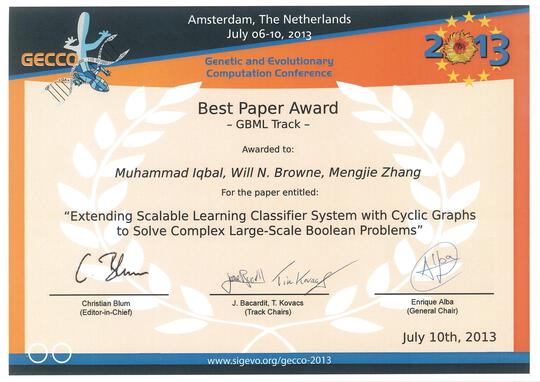Best Paper at International Conference on Evolutionary Computation
25 Jul 2013 - 11:27:03 in Research
Congratulations to researcher Muhammad Iqbal and his supervisors Dr Will Browne and Prof Mengjie Zhang on a Best Paper award at a leading International Conference on Evolutionary Computation.
At the recent Genetic and Evolutionary Computation Conference, GECCO, Amsterdam, July 2013, they were awarded the best paper in the Genetics-based Machine Learning Track. GECCO is an Australian Research Council (ARC) A-rated conference. There were only 13 best papers awarded out of 570 submitted papers from the leading researchers worldwide.
The core idea of the work is to reuse already learnt information to solve increasingly harder problems, which the research team has shown to scale successfully to problems previously unsolved in machine learning. Surprisingly, nearly all other machine learning algorithms restart learning at the start of each new problem. This work introduces evolvable finite state machines into a problem's representation as a way of reusing cyclic building blocks, which are most appropriate for domains requiring repetitive patterns of knowledge. The work produced for the first time compact solutions that could solve any size problems in a number of important domains, such as parity problems. Evolutionary Computation is a branch of Artificial Intelligence which takes its inspiration from Darwinian ideas of survival of the fittest as multiple solutions are tested and bred with each other until the fittest survive. The research team form part of the Evolutionary Computation Research Group (ECRG), Victoria University of Wellington, which is one of the largest and most successful groups of this type in the world - currently with available doctoral places and scholarships available.
Track: Genetics Based Machine Learning
Extending Scalable Learning Classifier System with Cyclic Graphs to Solve Complex Large-Scale Boolean Problems. Muhammad Iqbal, Will N. Browne, Mengjie Zhang
(muhammad.iqbal@ecs.vuw.ac.nz; will.browne@ecs.vuw.ac.nz; mengjie.zhang@ecs.vuw.ac.nz)
Abstract:
Evolutionary computational techniques have had limited capabilities in solving large-scale problems, due to the large search space demanding large memory and much longer training time. Recently work has begun on automously reusing learnt building blocks of knowledge to scale from low dimensional problems to large-scale ones. An XCS-based classifier system has been shown to be scalable, through the addition of tree-like code fragments, to a limit beyond standard learning classifier systems. Self-modifying cartesian genetic programming (SMCGP) can provide general solutions to a number of problems, but the obtained solutions for large-scale problems are not easily interpretable. A limitation in both techniques is the lack of a cyclic representation, which is inherent in finite state machines. Hence this work introduces a state-machine based encoding scheme into scalable XCS, for the first time, in an attempt to develop a general scalable classifier system producing easily interpretable classifier rules. The proposed system has been tested on four different Boolean problem domains, i.e. even-parity, majority-on, carry, and multiplexer problems. The proposed approach outperformed standard XCS in three of the four problem domains. In addition, the evolved machines provide general solutions to the even-parity and carry problems that are easily interpretable as compared with the solutions obtained using SMCGP.

